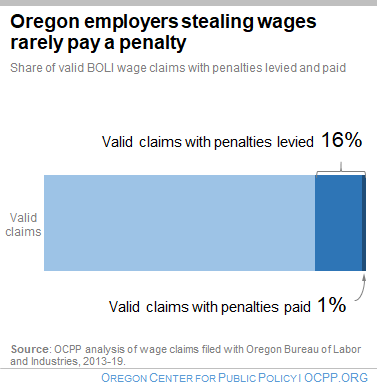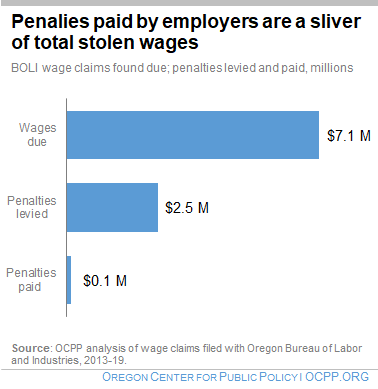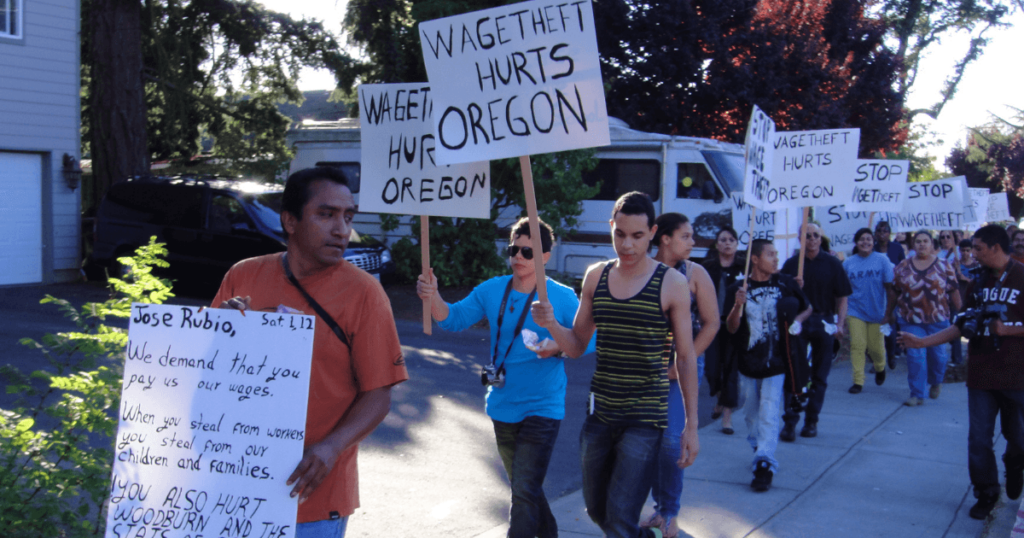Oregon employers face almost no downside to stealing the wages of workers, given that the boss rarely pays a penalty when caught. Although the state may compel employers to pay the wages owed, in only 1 percent of wage claims found to be valid by the Oregon Bureau of Labor and Industries (BOLI) do employers wind up paying a penalty for their wrongdoing.[1] The fact that employers risk little when they violate labor law exacerbates the problem of wage theft in Oregon.
BOLI rarely penalizes employers for wage violations; employers rarely pay
Wage theft is a persistent and widespread problem.[2] Wage theft is a catchall term for the many ways employers fail to pay workers the wages they have earned, such as failing to pay overtime, requiring people to work off the clock, and stealing tips. By one estimate, it costs low-paid workers nationwide over $50 billion annually.[3] In Oregon since 2006, workers have submitted claims for unpaid wages worth more than $50 million.[4]
Despite the pervasive problem that is wage theft, BOLI rarely imposes penalties on employers as a way to deter misconduct. When a worker suffers a wage violation, they may file a claim with BOLI. Of the wage claims filed over the period 2013-19, the Bureau found most of them — 3,703 in total — to be valid. Even though the agency has the authority to impose penalties in addition to requiring payment of wages, it does so rarely. BOLI levied penalties on just 16 percent of valid claims over the six-year period.
The penalties BOLI does impose, moreover, offer little deterrent because seldom do employers pay them. For nearly all claims filed between 2013 and 2019, once an employer paid the wages found due, the bureau closed the case without requiring payment also of any penalty.[5] In just over 1 percent of valid cases did employers pay a penalty.

Dollar amounts confirm the paltry nature of penalties
When looking at the dollar amount of stolen wages, the picture is no different. Over the same six-year period, Oregon workers filed valid wage claims totaling $7.1 million. BOLI imposed $2.5 million in penalties, which amounts to about 36 percent of the wages found to be due. Employers actually paid $139,000 in penalties — just 2 percent of the amount of stolen wages.

Oregon needs stronger tools to deter wage theft
Given that Oregon employers rarely face a penalty, there appears to be little risk to stealing wages. The lack of a meaningful deterrent exacerbates the problem that causes workers to lose out on wages they have earned.
The current situation underscores the need for Oregon to do more to deter wage theft. Two steps Oregon can take are the following:
- Bolster BOLI. BOLI’s capacity to deter wage theft through penalty enforcement and other means has dramatically shrunk over several decades.[6] Increasing its budget would give the bureau more resources to enforce wage laws.
- Enlist community support. Given the magnitude of the problem and budget constraints, the state should find creative ways to enlist the community in helping the agency accomplish its mission of protecting workers and enforcing Oregon’s labor laws. By enacting HB 2205 —the Just Enforcement Act — the state would empower workers to enforce the law when state officials lack enforcement capacity.[7]
[1] Unless otherwise noted, all figures in this fact sheet refer to Oregon Center for Public Policy’s analysis of wage claims submitted to BOLI between July 2013 and June 2019.
[2] Evidence of Widespread Wage Theft, OCPP, May 21, 2012; Oregon’s Wage Theft Problem Persists, OCPP, January 14, 2014; Wage Theft Increases Poverty and Costs to the Public, OCPP, February 13, 2017.
[3] Celine McNicholas, Zane Mokhiber, and Adam Chaikof, Two billion dollars in stolen wages were recovered for workers in 2015 and 2016—and that’s just a drop in the bucket, Economic Policy Institute, December 13, 2017, p. 3.
[4] OCPP analysis of Bureau of Labor and Industry (BOLI) data for July 2006 to June 2019.
[5] For claims filed between 2013 and 2019, 0.7 percent remained open as of October 23, 2020.
[6] Oregon’s Capacity to Fight Wage Theft Has Eroded, OCPP, March 28, 2019.
[7] House Bill 2205, Oregon Legislature, 2021 Regular Session.





